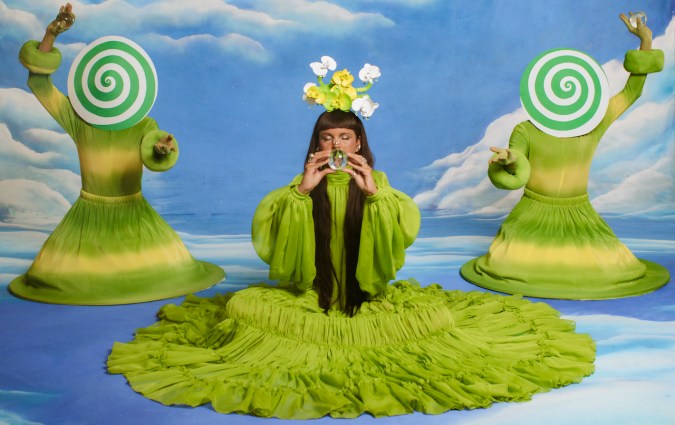It doesn’t take much for us to think we’re living through the end of time. There’s climate change, radical hate rhetoric, disease, and so on. This propelled Bomba Estéreo to conceptualize the album that would become Deja, their newest full-length effort and first in four years. Two years ago, they wrote and recorded a song cycle of apocalyptic visions and their aftermath; but before they could finish it, the COVID-19 pandemic took over and forced them to stop. In turn, they seized their time in lockdown to envision an artistic work for a brighter future, resulting in perhaps their most ambitious album to date.
“To be very honest with you, I prefer this,” Simón Mejía tells Remezcla via Zoom call about slowing down. “I do thank the pandemic for that. I think that, in terms of making music, it’s better to take your time. It’s something that could not have happened in any other way.”
The road to Deja was paved from the moment of their inception in 2006 when Mejía started the project as a solo affair. With the addition of vocalist/lyricist Li Saumet, Bomba Estéreo took off shortly after thanks to their explosive sound, a combination of cumbia, folk, pop, and electronic music that coalesced in their sophomore effort Estalla in 2008, giving us their first hit, “Fuego.” International tours, Grammy and Latin Grammy nominations, soundtrack appearances, festival headlining slots, celebrity endorsements, and more hits like “To My Love” and “Soy Yo” followed. Bomba Estéreo became one of the most unique outfits of the last decade.
Deja marked the first time Bomba Estéreo wrote and recorded as a band of collaborators, Incorporating their touring guitarist José Castillo and percussionist Efraín “Pacho Carnaval” Cuadrado, the band retreated to Saumet’s beach house in Santa Marta, Colombia, where the quartet fine-tuned and recorded their songs. “[Bomba Estéreo] is a collaborative project,” says Mejía. “[Li and me] may be the visual part of the equation but there have always been people who bring their own and distinctive energy to each album. However, this album is our most collaborative effort since it was completely written as a group effort.” Additionally, Saumet invited Lido Pimienta to the house to bounce off vocal and lyrical ideas off each other. For her part, Pimienta brought in the Cuban duo OKAN to the session.

Then everything came to a halt.
Thus, Bomba Estéreo had to redefine their original concept for something more humanistic and ambitious with help from collaborators like Mexican songwriter Leonel García (“Como Lo Pedí“) and Nigerian singer Yemi Alade (“Conexión Total“). While some of the standout tracks are about depression and disconnection from reality, the overall message behind the record became an optimistic one.
Deja is divided into four different sections, each corresponding to the elements that bring equilibrium to human beings—Fire, Water, Earth, Air—and it allowed the album to be released as four separate EPs throughout 2021. “We were thinking in terms of our live shows and we thought about basing it on the end of the world,” says Mejía about the underlying concept of Deja and its evolution. “We thought about everything that was happening in the world and how everything could be rebuilt from the ashes. Then we saw what was happening—especially early in the pandemic, the images we saw around the world— and we thought, ‘Wow, this is real.’ I don’t know if it was a premonition or not, but it propelled us to find a positive side to what’s happening. We have ways to keep the world from ending. We have to take care of the elements that make life on the planet possible, you know?”


“The world is in a pretty dark place and I think that music is a way to liberate ourselves from the darkness,” Mejía continues. “At the end of the day, we play festive, joyous dance music. We maintain that spirit of cumbia. It comes from slaves and people who were subjugated by the colonists, the white men. So even though they were chained, being killed, and having a real bad time, they had music to lift their spirits up. They would get together to play music and dance to cumbia; it was their way of invalidating the darkness. Music remains a lifesaver.”
For the last few months, we have seen the world coming to an end, or perhaps it has already ended and we’re living in the aftermath; perhaps it’s too early to say. Yet the fact is that it has changed drastically and keeps on changing. Deja is a testimony to how the changes affect us, and most importantly, how we can change it for the better.
Listen to Deja below:





